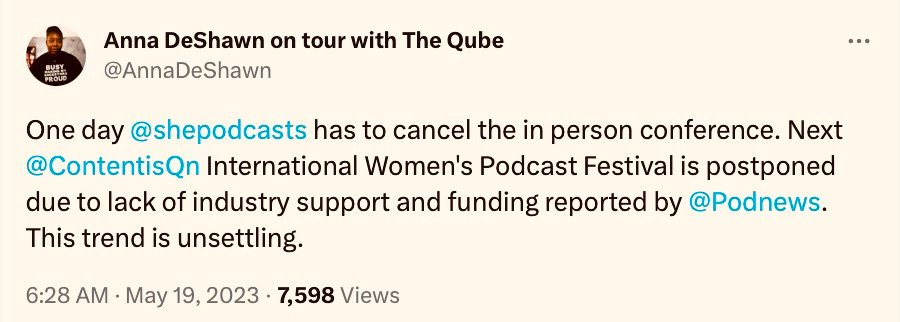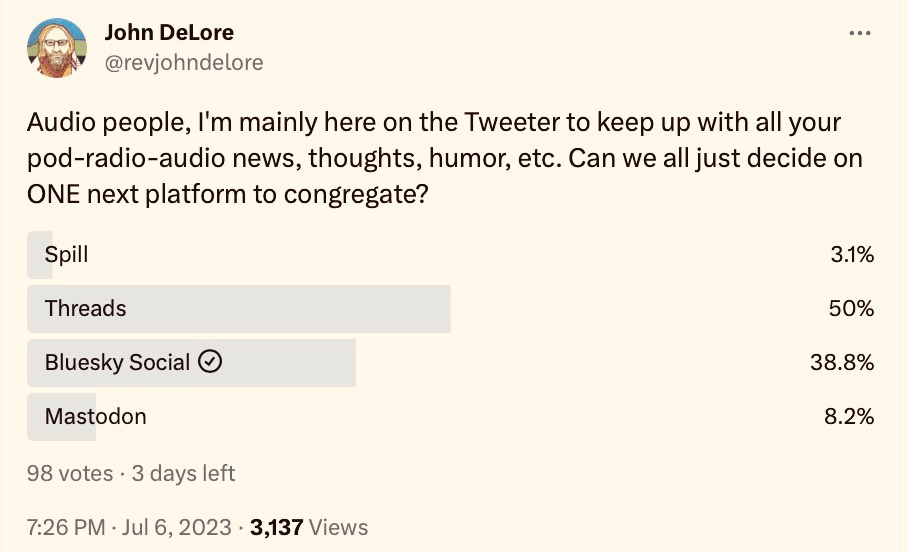Can Open Letters Change the Podcasting Business?
PLUS: A Surprise for Tonight's Zoom with Paid Members
Hello, everyone!
It’s Skye here — back from travels but still battling the time difference — with a quick announcement: Eve Batey, who wrote today’s piece, will be joining me on today’s Zoom with paid members! I invited her to join us in case any of you would like to ask her questions about her reporting and of course, I’d also like to hear any perspectives that you might have on the issues surrounding speaking up and demanding action from those who hold power in podcasting. (Btw, huge congrats to Eve, who just landed a job as Vanity Fair’s Weekend Editor — woot woot!)
There is still time to join the Zoom! Sign up for a paid membership today and email me at skyepillsatwork@gmail.com anytime before 4pm PT / 7pm ET TODAY for the Zoom link.
Alright, Let’s hit it!
Can Open Letters Change The Podcast Business?
by Eve Batey
When George Floyd was killed by Minneapolis police in 2020, the U.S. podcast industry — like most American businesses — reacted to the slaying and subsequent social justice uprising with promises of a new focus on diversity, inclusion, and equity. Sometimes, the assurance was telegraphed by a simple black square from a spoken word brand’s Instagram account, while others issued press releases and statements announcing an intention to look past podcasting’s dominant voices and amplify those from historically and systemically marginalized groups. It was quite a time, wasn’t it?
But about once a year since — in 2021, and twice so far this year — open letters by insiders in the business have either demanded that those same brands prove that they’ve followed through on those claims, or say that those promise-filled days in 2020 never came to fruition. Every year, those letters make headlines in trade publications and are widely discussed across Podcast Twitter…and then, the industry seems to move on. Today we’re taking a look at three of those widely discussed open letters; we also spoke with two of the people behind them to see what, if anything, has changed as a result. Here’s what we figured out.
January, 2021
Seven months after Floyd was killed, former public media host Celeste Headlee penned “An Anti-Racist Future: A Vision and Plan for the Transformation of Public Media.” Posted to Medium about a year after the platform launched its metered paywall, its possible that its status as a “member-only story” somewhat inhibited its spread. But still, Headlee’s piece holding National Public Radio and other publicly funded audio outlets to task for “their past and present racism — in terms of coverage, relationships to communities of color, and how they have treated BIPOC employees” garnered coverage on NPR and public media trade pub Current, as well as podcast-specific outlets like Discover Pods.
Though The Squeeze reached out to Headlee for this story, we didn’t receive a response. However, anyone who would assume, based on that lack of response, that her views have changed would be incorrect, as the journalist has since published a book called Speaking of Race: Why Everybody Needs to Talk About Racism—and How to Do It. In addition, her Twitter account — still active even in the new era of Threads — retains the same tone and leanings that her ambitious and far-reaching letter did.
Based on reporting from the time, Headlee was moved to write the letter — which she did with fellow members of what was then called the "Public Radio Anti-Racist Partnership,” — after an at-capacity Zoom during which she heard “alarmingly similar” accounts of workplace bias and aggressions micro and macro from public media employees of color from around the country.
“A number of people talked about patterns of abuse that led to the departure of journalists of color,” Headlee told Current at the time. “They all said that there was very little concern when JOCs left, even if they were only the most recent in a line of people to leave an organization. What’s more, there were many stories about managers setting up listening sessions to hear complaints about inequality and racist behavior but then taking no action in response to what was said during those meetings.”
Reading over the letter, which was signed by over 200 audio professionals from across the globe, it’s a challenge to determine which recommendations, if any, have been adopted by the higher-profile podcast producers within public media. (Headlee would likely have greater insight into this, so, Celeste, if you’re reading this, we’d love to do a follow-up with you! Please do respond to my email, email Skye directly at skyepillsatwork@gmail.com, or send Skye a DM on Twitter.) If you have any observations on its impact, please do share them in the comments.
Late 2022-February, 2023
Formed in 2016, podcast studio Parcast was acquired by audio giant Spotify in 2019 for an estimated $100 million, scoring the streamer 18 podcasts at the time of acquisition (and a reported 20 shows more in the pipeline). Workers at Parcast unionized the following year with the Writers Guild of America, East (disclosure: this reporter is also a member of the WGAE). The reason for the unionization (as reported by The Verge)? “It wants to see Spotify commit to diversity, equity, and inclusion,” reporter Ashley Carman wrote at the time, “as well as maintain a reasonable workload and overtime compensation.”
Parcast wasn’t the only Spotify-owned vertical to unionize in the name of DEI, as The Ringer’s guild (which was formed before that studio was purchased by Spotify) also said at the time that it “reached a tentative agreement with management to make hiring practices at The Ringer more diverse.”
Two years later, in 2022, Parcast’s union and Spotify management agreed on a contract that included “diversity promises” such as that — per The Verge — “half of all job candidates who progress past a phone interview be from an underrepresented group” and that the union receive a $100,000 annual diversity committee budget from Spotify.
That job candidate bit was expected to be reached by the end of the three-year union contract, but by late 2022, the union was already concerned that that promise might be empty. In a letter released in February 2023, the union said that of the $100K promised for, as PodPod put it, “to help fund more diversity and inclusion within recruitment, selection, retention, mentorship, advancement, and editorial coverage,” only $5000 had been made available. It also said that Spotify had failed to provide “guidelines and rules that will help clarify the funding process.”
Following the release of the letter, a Spotify spokesperson said that “it remains a priority to thoughtfully utilise the allocated fund in accordance with the committee’s goals.” But four months later, Parcast was gone, a casualty of Spotify’s latest round of layoffs.
According to a former Parcast employee, to whom The Squeeze granted anonymity due to the workers’ fear of retaliation, prior to the layoffs they believed the open letter did indeed make waves within the company.
“We actually wound up making some headway internally after the letter,” the former Parcast worker said, though “it was still weird and they never mentioned our letter or demands.”
“But suddenly we got two meetings and a project approved,” they said,
It’s possible, the former employee said, that internal pressure to diversify had increased as a result of a Bloomberg article, also written by Carman, which dropped a month after the union’s letter. “Spotify Has Spent Less Than 10% of Its $100 Million Diversity Fund,” detailed how the Creator Equity Fund (CEF) “for licensing, development, and marketing of music … and audio content from historically marginalized groups” — which had been announced by Spotify in the wake of incendiary statements made by flagship podcaster Joe Rogan — had been spinning its wheels. (Variety published a solid aggregation of Carman’s report, if you don’t have a Bloomberg subscription.)
According to the former Parcast worker to whom we spoke, Carman’s report “really rocked the company.” The staffer recalled that in response, Spotify’s communications team posted a message to the company Slack touting a recent event at HBCU Spelman College that they claimed was an example of CEF in action, and accusing Carman of opting “to exclude many of our points” as “CEF’s ongoing work continues to shine.”
The Squeeze reached out to Spotify regarding the current state of CEF, but has not received a response as of send time. Two days after our outreach — and I’m not noting this in a way that suggests we had anything to do with it; just that the timing felt like kismet — Spotify announced its latest Making Space studio in Atlanta, a studio intended to help “build a more diverse ecosystem of podcast creators.”
May 2023
While the U.S. was gearing up for Memorial Day weekend, in London Content is Queen founder Imriel Morgan was preparing to press publish on yet another open letter, this one entitled “Time to Turn Words into Action.” In a letter signed by a global list of podcasters and audio creators, Morgan called out “the persistent lack of support for marginalised creators in the audio industry,” and called for “an honest and critical examination of the industry’s funding practices.”
According to Morgan, who spoke with The Squeeze last week, the letter was a reaction to her decision to cancel her company’s annual Women’s Podcast Festival, a global event that was “created so attendees from every background can see themselves represented – including people of colour, LGBTQIA+ people, people with disabilities, young professionals/newcomers, parents and older attendees.” But after years of support from some of the biggest names in audio, this year, the funding dried up.
“Audio partnerships and sponsorships that we've been quite successful at achieving in previous years were just getting harder and harder,” Morgan said. “Conversations were dragging out for months and months, [and] people were then telling me that they had committed their funding to other events.” Events, it appears, that catered less to marginalized people and more toward podcasting’s core demographic (on both sides of the mic) of cis, white, straight males.
Morgan admits that the current economy is likely a factor, but she maintains that that can’t be the only reason that a funder who leapt at the chance to support a diversity effort in 2021 was slower to do so now. “Yes, there were all of these talks and headlines about constriction and reduction in staff and budgets are being slashed left, right and center … So I knew that there was a general atmosphere of reduction in spending. But I didn't think people would also think that a women's podcast event” would be an impossible financial burden. After speaking with other organizers of podcast events pitched to people of color and other outside-the-podcast-margins groups, she realized she wasn’t alone. To fund these events would be “a drop in the bucket for some of these companies,” she said. “So that made me angry.”
And then, Carman’s Bloomberg story — the same one that so riled Spotify inside and out — dropped. “I've been in conversations with Spotify about this bloody festival,” as had the other festival organizers who’d also been unable to find funding. “But there's apparently $100 million allocated to this work, and we haven't seen any of it. So where's the money going?”
Morgan worries that the further we get from the summer of 2020, the bleaker this picture will look. A few days after she posted her letter, she took to Twitter to look at the “black square pledges” made following George Floyd’s slaying, concluding that “We've observed fewer resources distributed among grassroots organisations supporting the audio industry and developing its talent. If funds exist, we'd like to know their impact and how groups can access these resources.”
Besides the inevitable fade of good intentions, there is the challenge of a potential recession to contend with. “In recessions — especially in tech processions — diversity hires tend to be the first to go. And it's not just DEI leaders or people that are hired into those positions. But when a company is already late to the game when it comes to making hires of women, people of color, people of different sexualities … those hires go first, because it's last in, first out.”
While Morgan says this is true for all industries, not just podcasting, she says that in a relatively small business like audio, the issue becomes more acute. “The people who are deciding the stories that are going to be told and what gets funded are almost exclusively white males. And occasionally a white woman enters. But then, when it comes to pitching or getting commissions or getting funding for stories, the response is ‘oh, that doesn't have broad enough appeal. That's probably not gonna work. I can't see how that's interesting.’ And it's like, that’s because it's not interesting to that white male gatekeeper.”
According to Morgan, since she published the letter she’s received outreach from a few longtime partners, and that conversations are ongoing. In other cases, as with Amazon Music’s podcasting arm, an email from a representative said that “senior leadership would be in touch.” However, “I'm still waiting for the response from senior leadership, who were all CCD on this email. So it's not like they didn't see the exchange.”
Morgan knows that senior managers of podcast companies must all be aware that there’s a diversity problem within their companies, so the answer isn’t bombarding them with stats or data. “They keep saying ‘we need to do better’ or ‘we will do better,’ well, then do better. Just stop talking about the fact that you're going to do better and do it, or just shut up, and just do the all white thing that you've been doing. And then we will just know what's up.”
That it for The Squeeze this week!
If you enjoyed this article, please consider upgrading your subscription to paid — and joining us on Zoom later today!
Postscript: I agree with John — can we all just pick a place and go?





